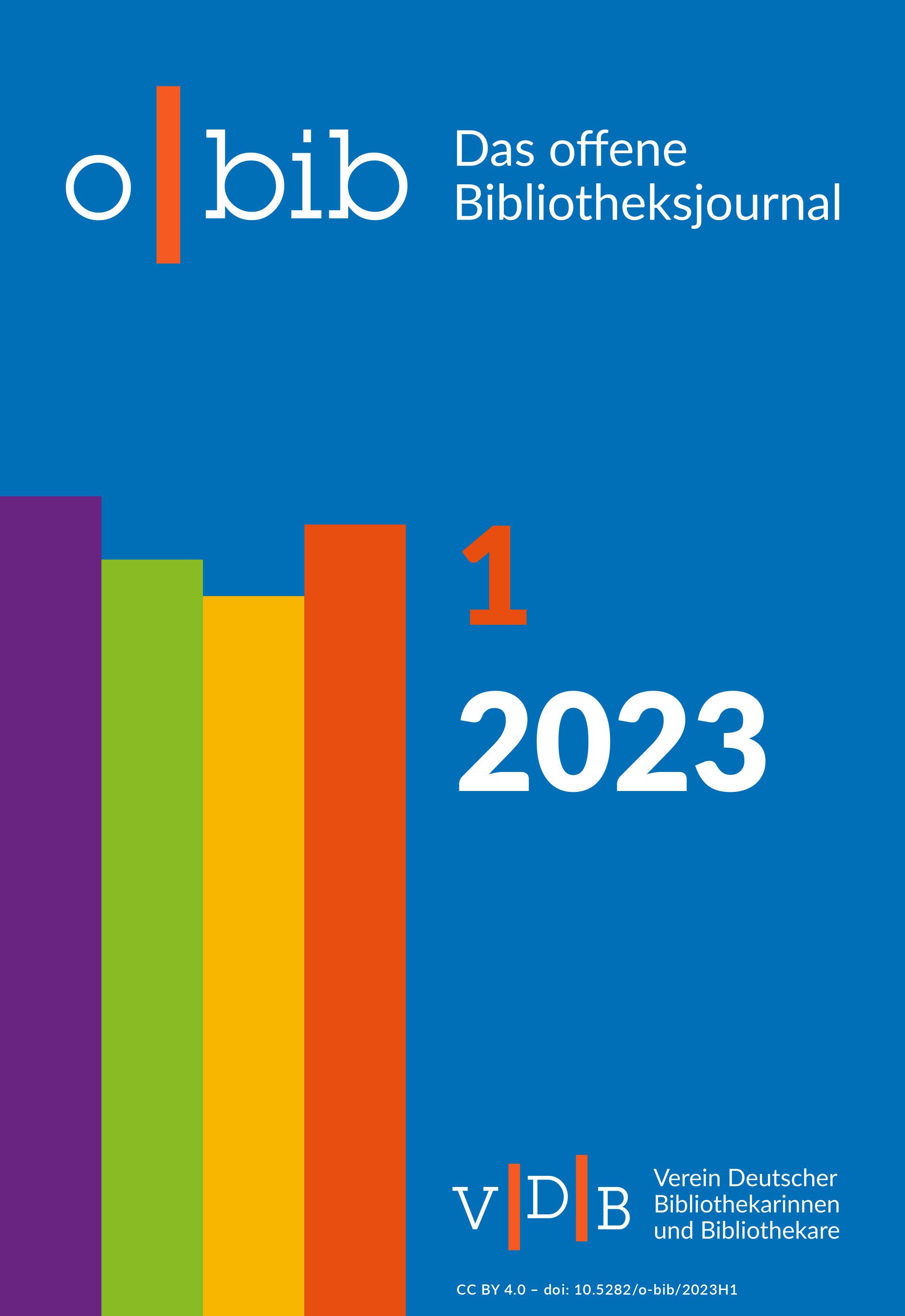Lizenzmodelle für digitale Schulbücher in wissenschaftlichen Bibliotheken
Ergebnisse und Perspektiven einer Markt und Bedarfsanalyse
DOI:
https://doi.org/10.5282/o-bib/5897Keywords:
Textbook, Acquisitions, Digitization, LicenseAbstract
With the “Digital Pakt Schule” (Digital Pact for Schools) initiated in 2019, the digital transformation in school education is also being accelerated in Germany and new teaching and learning methods are being developed for the classroom. Educational media publishers have geared their business models for digital textbooks primarily to schools and teachers. The needs of libraries have not been considered so far. Based on a market analysis of existing licensing models, the Leibniz Institute for Educational Media | Georg Eckert Institute (GEI), within the framework of the Specialist Information Service (FID) Educational Science and Educational Research, has elicited the requirements of academic libraries that want to make digital textbooks available to their users. The article presents the results of the needs assessment and shows how educational media publishers must design electronic access rights, acquisition methods and distribution channels, among other things, so that academic libraries can optimally support research and teacher education. The central finding is that educational media publishers could take up proven structures and offers of academic publishers in their cooperation with libraries. This serves as a basis to developing together licenses for digital textbooks in academic libraries.
References
Bayerische Staatskanzlei: Verordnung über die Zulassung von Lernmitteln (Zulassungsverordnung – ZLV) vom 17. November 2008 (GVBl. S. 902) BayRS 2230-3-1-1-K, Online: https://www.gesetze-bayern.de/Content/Document/BayZLV/true, Stand: 10.03.2023.
Bock, Annekatrin; Hertling, Anke: Das Schulbuch im Wandel – Digitale Bildungsmedien und Open Educational Resources, in Nieländer, Maret; De Luca, Ernesto William (Hg.): Digital Humanities in der internationalen Schulbuchforschung, Göttingen 2018, S. 69–89. Online: https://repository.gei.de/handle/11428/296, Stand 10.03.2023.
Bohne-Lang, Andreas: Technische Möglichkeiten des Zugriffs auf lizenzierte Verlagsinhalte durch Bibliotheksnutzer, in: ABI Technik 32 (2012) 2, S. 62-67. Online: https://doi.org/10.1515/abitech-2012-0012.
Bonitz, Anika: Digitale Schulbücher in Deutschland – Ein Überblick, in Matthes, Eva; Schütze, Silvia; Wiater, Werner (Hg.): Digitale Bildungsmedien im Unterricht, Bad Heilbrunn 2013, S. 127–138.
Ernst Klett Verlag GmbH: Klett x Studyly: Neue KI-basierte Lernplattform für den Mathematikunterricht. Online: https://www.klett.de/sixcms/detail.php?id=1141915&template=pr_pm_detail, Stand: 10.03.2023.
Fichtner, Sarah; Bittner, Martin; Bayreuther, Tamara; Kühn, Vanessa; Hurrelmann, Klaus; Dohmen, Dieter: Schule zukunftsfähig machen – Cornelsen Schulleitungsstudie 2022. Online: https://www.cornelsen.de/schulleitungsstudie/vorjahre/, Stand: 10.03.2023.
Frohn, Philipp: Klett, Cornelsen und Co - Raus aus der Kreidezeit: Schulbuchverlage wollen den Unterricht digitalisieren Online: https://www.handelsblatt.com/unternehmen/it-medien/klett-cornelsen-und-co-raus-aus-der-kreidezeit-schulbuchverlage-wollen-den-unterricht-digitalisieren/26661012.html.com, Stand: 10.03.2023.
Heimstädt, Maximilian; Dobusch, Leonhard: Ein Plädoyer und vier Szenarien für offene Schulbücher. Online: https://makronom.de/oer-oekonomische-schulbildung-ein-plaedoyer-und-vier-szenarien-fuer-offene- schulbuecher-30143, Stand: 10.03.2023.
Herb, Silvia; Korneli-Dreier, Diane: Schulbücher finden nur schwer in den Bestand wissenschaftlicher Bibliotheken, in: BuB: Forum Bibliothek und Information 69 (2017) 10, S. 516-517. Online: https://b-u-b.de/fileadmin/archiv/imports/pdf_files/2017/bub_2017_10_516_517.pdf, Stand: 10.03.2023
Hertling, Anke: Auf dem Weg der digitalen Transformation: Neubau der Bibliothek des Leibniz-Instituts für Bildungsmedien |Georg-Eckert-Institut (GEI), in ABI Technik 42 (2022) 2, S. 109–119, Online: https://doi.org/10.1515/abitech-2022-0020.
Hindersmann, Jost; Tholen-Wandel, Carin: Warum eBooks das Leben nicht unbedingt leichter machen, in: b.i.t online 21 (2), 2018, S. 116–127, Online: https://www.b-i-t-online.de/heft/2018-02/fachbeitrag-hindersmann.pdf, Stand: 10.03.2023.
HRK: Lehrer:innenbildung in der digitalen Welt. Entschließung des 150. HRK Senats am 22.03.2022 Videokonferenz. Online: https://www.hrk.de/positionen/beschluss/detail/lehrerinnenbildung-in-einer-digitalen-welt/, Stand: 10.03.2023.
Leibniz-Institut für Bildungsmedien | Georg-Eckert-Institut: Digitale Bildungsmedien erweitern das Erwerbungsprofil, in Jahresbericht 2016, S. 28–29. Online: http://www.gei.de/publikationen/jahresbericht.html, Stand: 10.03.2023.
Nieländer, Maret; De Luca, Ernesto William (Hg.): Digital Humanities in der internationalen Schulbuchforschung, Göttingen 2018, Online: https://repository.gei.de/handle/11428/296, Stand: 10.03.2023.
Westermann GmbH & Co. KG: Bildungsmedienanbieter Westermann entwickelt KI-System für das Lernen in der Schule. Online: https://www.westermanngruppe.de/detailansicht/bildungsmedienanbieter-westermann-entwickelt-ki-system-fuer-das-lernen-in-der-schule/, Stand: 10.03.2023.
Downloads
Published
Issue
Section
License
Copyright (c) 2023 Michael Wagner, Anke Hertling

This work is licensed under a Creative Commons Attribution 4.0 International License.





